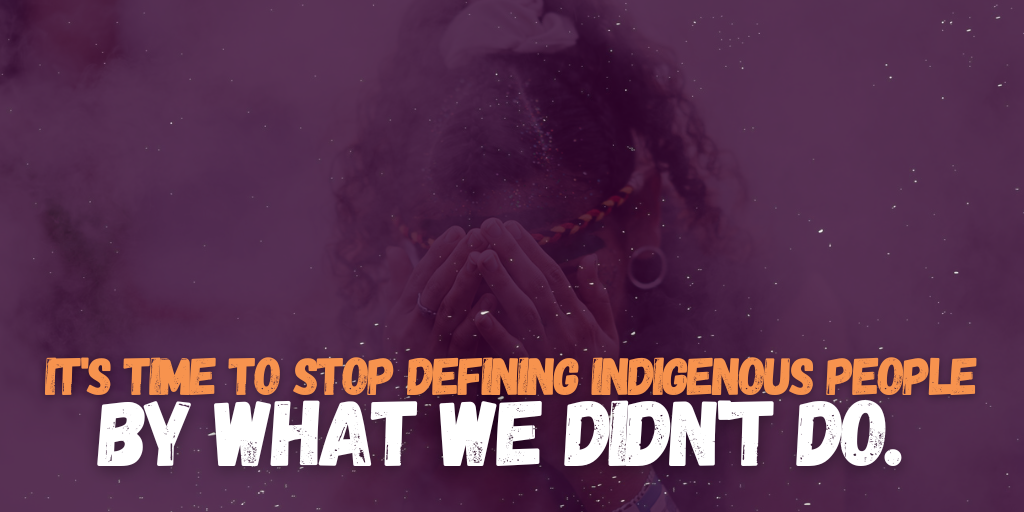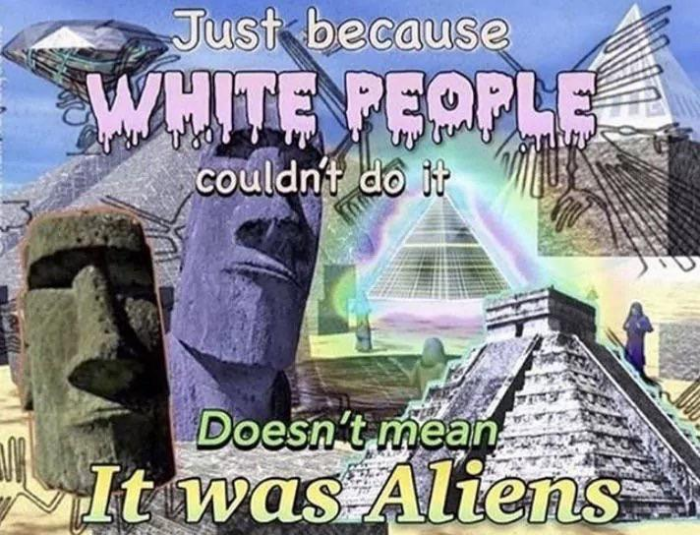It’s time to stop defining Indigenous people by what we didn’t do.

Before white supremacy came to Australia, bringing with it invasion, colonisation, subjugation and any number of introduced diseases, Indigenous peoples had been living here for 60,000 years. We were not passively waiting for white people to come but instead were living our lives on our own terms.
‘Other cultures are not failed attempts at being you’
Too often, Indigenous peoples and cultures are taught by white people through a lens of deficit; what we didn’t have or what we didn’t do.
“Aboriginal people didn’t invent the wheel.”
“Aboriginal people didn’t have a written language.”
“Aboriginal people didn’t build farms or cities.”
“Aboriginal people did not domesticate animals.”
This comparative lens can create the impression that we were not ‘advanced’ enough to invent or discover these things. It suggests a world where these things serve as markers of civilisation; allowing us to place all cultures on a scale of superior to inferior based on the technologies they used.
This framing is entirely ahistorical and contributes to a very outdated and factually inaccurate view of human history.
Even though we rarely use the terms ‘superior’ and ‘inferior’ anymore, the message is still clearly enforced.
The wheel is a great example of this, so too are domesticated animals.
The wheel is not a marker of civilisational advancement, where a society becomes sufficiently evolved once it has been invented.
Importantly, white people did not invent the wheel, or the written language, or the domestication of animals. Like the majority of civilisations around the world, these things were introduced to them at some point in history.
In pre-invasion Australia, we lacked a need for the wheel and, with the exception of the dingo, did not have animals suited for domestication.
Instead of using a comparative lens of inventions to gauge our ‘advancement,’ understanding Aboriginal life prior to colonisation is better explored through the idea of environment, culture and worldview – what was the environment like, and how did people adapt to their environment and similarly how did we adapt our environment to suit our needs. What are the things we held as important, and how did this influence our way of life?
As Wade Davis once wrote, “The world in which you were born is just one model of reality. Other cultures are not failed attempts at being you; they are unique manifestations of the human spirit.”
Choosing not to recognise this is a fundamental element of white supremacist thought.

Reimagining a world where white people are the pinnacle of human evolution as using this status as the ‘superior’ species as a direct and indirect justification for colonisation, slavery and countless other atrocities committed throughout history.
It positions colonisation not as an exercise of control, power and exploitation, but as a benevolent act of ‘spreading civilisation’ across the globe.
We see this continued today when people talk of how Aboriginal people should be thankful for our invasion because of all of the ‘wonderful things’ it gave us, like iPhones.
But it begs the question, how much did you pay for your iPhone? 200 years of oppression and marginalisation feels like a steep price. Even more so when you acknowledge that Aboriginal people never entered willingly into this ‘trade’.
Recognising that white people are not the ‘superior’ race and notions of ‘superiority’ are not a justification for oppression are crucial to recognising Indigenous Sovereignty.
Indigenous peoples have achieved amazing things, as have all cultures around the world, but we should not hold these up as proof that we are not inferior because doing so validates the core premise, that cultures exist on such a scale to begin with.
Australia is home to what is likely to be the oldest still standing man-made structure, the oldest evidence of bread making, the oldest evidence of human religion, the first astronomers and many other amazing achievements, and these should be recognised and celebrated – but if we didn’t have these things, would it somehow make it ok that our lands were invaded, our sovereignty ignored, or our human rights abused?
A long standing trope that is often touted about why we should destroy the environments of cultures with little to no interaction with the outside world is along the lines of ‘But what if they have the cure for cancer?!”
Well, what if they don’t?
I feel the same when people say ‘We have so much to learn from Indigenous cultures!” That is true, but it is not our job to teach you, nor is it a necessary requirement for our right to maintain our culture.
The rights of a culture to exist cannot be measured in terms of how they might provide benefits to you. Our value is intrinsic. Our right to exist is inalienable.
We should not be judged on nonsensical and implicitly racist ideas of ‘superiority’; we should not be expected to be ‘thankful’ for the perceived benefits of invasion; and the value of our cultures should not be assessed on how they might benefit others.
The diversity of cultures is as important to the world as is biological diversity. Cultures do not exist as a smorgasbord for western society to extract from, to pick and choose what is ‘useful’ or important and, by extension, which aspects are ok to destroy, disregard or force to disappear from the planet.




